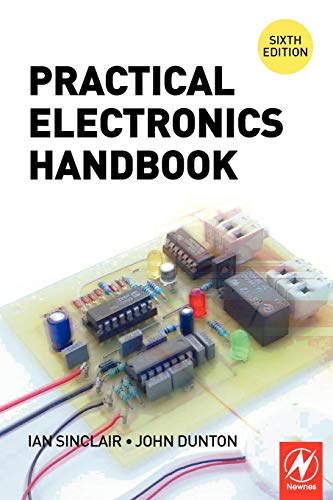(Part 2) Top products from r/robotics
We found 21 product mentions on r/robotics. We ranked the 208 resulting products by number of redditors who mentioned them. Here are the products ranked 21-40. You can also go back to the previous section.
21. Programming Robots with ROS: A Practical Introduction to the Robot Operating System
Sentiment score: 2
Number of reviews: 2
O Reilly Media
 Show Reddit reviews
Show Reddit reviews23. AVR: An Introductory Course
Sentiment score: 1
Number of reviews: 1
Used Book in Good Condition
 Show Reddit reviews
Show Reddit reviews25. Practical Electronics Handbook
Sentiment score: 1
Number of reviews: 1
Used Book in Good Condition
 Show Reddit reviews
Show Reddit reviews27. Introduction to Algorithms, 3rd Edition (The MIT Press)
Sentiment score: 0
Number of reviews: 1
Hard Cover
 Show Reddit reviews
Show Reddit reviews28. Bolo: The annals of the Dinochrome Brigade
Sentiment score: 0
Number of reviews: 1
 Show Reddit reviews
Show Reddit reviews30. Introduction to Autonomous Mobile Robots (Intelligent Robots and Autonomous Agents)
Sentiment score: 0
Number of reviews: 1
 Show Reddit reviews
Show Reddit reviews31. 4WD Smart Robot Car Chassis with 4pcs 60mm Mecanum Wheels 12V High Torque Motor for Arduino (Silver)
Sentiment score: 1
Number of reviews: 1
The car frame made of 3mm aluminum alloy materials, the mecanum wheel platform can bear 6-10kg.With All-metal gearbox, 4pcs 12V 330rpm DC decelerate motors can make the car chassis stable operation.This mecanum wheel mobile robotics car can be made to move in any direction and turn by varying the di...
 Show Reddit reviews
Show Reddit reviews32. Introduction to Autonomous Mobile Robots (Intelligent Robotics and Autonomous Agents series)
Sentiment score: 0
Number of reviews: 1
MIT Press MA
 Show Reddit reviews
Show Reddit reviews33. Robots for Shearing Sheep: Shear Magic (Oxford Science Publications)
Sentiment score: 1
Number of reviews: 1
35. Introduction to Robotics: Mechanics and Control (4th Edition)
Sentiment score: 1
Number of reviews: 1
 Show Reddit reviews
Show Reddit reviews36. Computer-Aided Analysis of Mechanical Systems
Sentiment score: 1
Number of reviews: 1
 Show Reddit reviews
Show Reddit reviews








Depends if you're just trying to tinker and make projects. If that is the case, read tutorials and watch youtube videos to do that. If not, read on.
At the basic level, you would want to have working knowledge of electrical engineering, embedded system programming and some mechanical engineering and some microprocessor architecture knowledge would be helpful.
Learning Resources
I recommend Introduction to Mechatronic Design by Ed Carryer (you might be able to find a cheaper international edition if you google around). This book should cover the aforementioned concepts to a good level of depth. Carryer's book is a good general robotics book. If you want to get deeper into kinematics and dynamics of robots, I recommend Robotics, Vision and Control. If you're interested in control theory side of things, the Brian Douglas Youtube Channel is a fantastic resource.
Also art of electronics is a really good reference book to have around. It's considered the bible of electrical engineering and I've found the book to be really useful.
You should also brush up on probability, multi-variable calculus, linear algebra and discrete mathematics.
If you're interested in motion planning, computer vision, sensor fusion etc., coursera has some good classes that you can find. UPenn has a robotics series that looks good (I haven't personally taken those courses.)
Learning Philosophy
In my opinion, a good chunk of learning happens when you have a problem at hand that you're trying to solve so project based learning is a good idea. Taking free online classes to tackle the more technical subjects can also be a good approach. Make sure you're learning actively. If you're reading a book about control systems and you aren't working with the material, it'll fade away quickly and the best way to remember it is to apply it. It might make sense to split your time between simulating robots (ROS), building robots (systems using rasPi, arduino, pic32 etc with sensors and actuators) and taking online classes.
Also, once you have a good level of understanding and are wanting to move to more cutting edge robotics work, you can start reading some research papers (IROS and ICRA papers can be a good place to start).
Let me know if you have any more questions. Happy to help.
Mechanical engineer, here. There is no substitute for actually building something, which it seems you're already doing. Outside of coursework and training, I would recommend the following resources:
FUNdaMENTALS of Design: You can download the PDF here. Tons of pictures and equations. This was the "course book" I used in undergrad @ MIT, and you can get it for free! Not really organized, per se, but one cool thing about it is that it's meant to be flipped through and printed double-sided. One side is always a birds-eye or holistic view, and the opposite side is always an in-depth and theoretical treatment of the topics. This is a great way to find out, "Wow! This exists, and here's what it's called!"
Mechanical Engineering Design: This is a pretty good primer on mechanical "stuff."
Mechanisms and Mechanical Devices Sourcebook: This is a great resource to keep handy. I look at this ALL the time, especially when I hit brick walls and need inspiration or fresh ideas.
Misumi: Pretty good place to get industrial-grade mechanical components... not sure about the prices for hobby-level stuff. They also have some good literature and tutorials here.
Hope it helps, and feel free to PM me if you have any questions.
Edit: primary != primer
There are two main parts of "everything else": Mechanical, and Electronic.
For most hobby-level robotics, the mechanical side of things is pretty simple. Learn about torque and power, and how to change them around (gears, pulleys, levers, etc.) and you're most of the way there. As long as your robot is small and moves reasonably slowly, it doesn't get much harder than that. I can't really offer a good book that covers this because my major is Mechanical Engineering and so my knowledge comes from a wide variety of textbooks and lectures.
The electronic side is much more involved. The best thing that you can do is learn how to solve systems of equations. Learn Ohm's law. Learn Kirchhoff's current and voltage laws. Learn how to do loop current analysis.... The most important thing for a beginner in electronics is to realize that circuit schematics are not flow charts. Current does not flow down one wire and then another. Everything is moving all the time. I strongly recommend Practical Electronics Handbook by Sinclair and Dunton.
Once you get into the more advanced robots, when you have a real budget and you're doing more complex things, believe it or not, the electronic side gets to be the easy part. The faster your robot moves and the more complicated moves it can make, the more advanced your mechanical analysis needs to be. College-level textbooks on kinematics, statics, and dynamics are your best bet. And just like the mechanics, the programming gets complicated much faster than the electronics. If you want to make a robot that can drive or fly around quickly, you get pretty deep into nonlinear control theory. Same for robot arms and motion planning.
Oh, as far as recommendations for actual robot products go, check out sparkfun and adafruit and see if any kits really catch your attention. Otherwise, Mindstorms products make the mechanical and electronic assembly of the robot much easier - you don't have to worry about the electronics at all, and the mechanics are just lego technic. That said, you won't learn any electronic theory from playing with Mindstorms, so it's a bit of a compromise.
Here is a suggestion I have. It's from a post I made a few weeks ago.
I went out and bought an AVR butterfly microprocessor from mouser.com for $20.
http://en.wikipedia.org/wiki/AVR_Butterfly
Then I went and bought John Morton’s book on programming AVRs in assembly language. Short, easy and fun. FUN.
http://www.amazon.com/AVR-Introductory-Course-John-Morton/dp/0750656352/
Next, I will work through a C book on AVR:
http://www.amazon.com/Programming-Microcontrollers-Featuring-Butterfly-Compiler/dp/0976682206/
And finally to tie it all together, I am becoming one with this website:
http://www.avrfreaks.net
Learning AVRs and assembler and C on those devices has been one of the most educational and fun things I have ever done. It just added life to my programming (I’ve been coding for 11 years). On top of all that it's cheap, the development environment is free.
Nick
Hi,
​
I recommend this book "Programming Robots with ROS" by O'Reilly, I've PMed you a copy. You can BUY the bat book new on amazon too for only $40 (link).
Once you know how to use ROS, you can quickly pull together other people's code for perception, manipulation, etc. and build stuff quick!! ROS is like lego for robotics. Learn how to search http://wiki.ros.org/ for existing code and hardware for you to integrate with.
​
Also, don't do it alone! The other thing that really helped me was joining the closest university/college robotics engineering design competition team. Lookup clubs near you. Even though I wasn't a student, they wanted all the help they could find, so I showed up, offered to help and they accepted! I worked with them for 15 hours a week (sometimes more) for a year. It went really well: https://github.com/danielsnider/ros-rover
​
The other key thing is finding the time. I worked part-time, so that I could focus on this on the side, pretty significantly focus.
​
​
I was hoping that this guy found a cheap way to make series-elastic actuators and give his robot a dynamic gait. Nope. Hobby servos and an Arduino.
It's a great robot IMHO as long as you don't start the conversation by calling it a scaled-down BigDog. The thing that makes the Boston Dynamics robots unique is robust, dynamic gait-- People were doing robust static gait as far back as the 1950s, and DARPA literally wrote the book on it with the Adaptive Suspension Vehicle back in the 80s.
Thanks for the reply good man. I like the idea with balls. However, I only have 1 Kinect and the motion would be quite slow to start with. Have you considered using Euler parameters to deal with singularity (1, 2, chapter 6)?
EDIT: Speaking of simulating tools: I will check JOGL and thought that you'd like to look at RobWork - comes with many libraries containing useful algorithm (includes few that deal with avoiding singularities) and vizualization tools.
pdf easy to find on google
Old papers? That stuff is pretty recent by my reckoning.
If you want the old work on robotics and vision you might try:
Prof. Robyn Owens full publications.
Peter Kovesi's Computer vision code.
The Sheep Shearing Robot they built, led by James P. Trevelyan starting in early 1980 (31 years ago) - I can't recall the exact date but they certainly had an early prototype, probably their second, running in 1982.
This was the project that inspired me to transfer out of Engineering and into pure / applied mathematics.
I'm in the same boat. Most of the Arduino tutorials I see are aimed at hardware people. They tediously explain what an
if ()statement is but assume you know how to hook up a MOSFET.I bought this book. I've not read it yet, but from what I've skimmed of it so far it seems pretty great -- just what I need. After that I think it's all about practical experience. Be ready to waste some money either damaging parts or buying the wrong parts. Luckily it's all pretty cheap.
What kind of robot do you want to make?
I have a Bachelor of Science in Industrial Automation. If your son truly has a robot as his spirit animal then I recommend this book for him and you, 123 Robotic Experiments for the Evil Genius!!!. My experience with USFirst teams is that one or two people in the group do the majority of fun stuff and those who are unfamiliar are just watching from the sidelines not learning anything. The book I gave you the link to will come with a PCB board that your son can build on his own, message me if you need help selecting the components, or you can purchase a BOE bot that comes with the platform you are building in this book.
I learned from Modern Control Systems by Bishop and Dorf, I thought it was pretty good. Here is the newest version.
I've been looking to buy a robot kit to test a algorithm I've been working (I've already simulated it) . The minimum width or length required is roughly 2 ft. but 3 ft. would be preferable. I was hoping something along the lines of this (https://www.amazon.com/Chassis-Mecanum-Wheels-Torque-Arduino/dp/B07PRW11VR/ref=mp_s_a_1_17?keywords=robot+wheel+kit&qid=1563432935&s=gateway&sr=8-17), but bigger. So essentially a 3 or 4 wheel robot with the motors, wheels, and a frame included. My budget is anything under $400. I have been looking for a while for a robot fitting these requirements but I haven't been able to find anything along these lines. Given that many of the redditers on this subreddit might have experience with similar design requirements, I was wondering if you know of any kits fitting these requirements?
Here's my 2 cents on ROS.
No. You technically don't need it to do robotics. At all. I will say however that aside from a set of pretty well maintained software packages and a meta operating system...it's a community and a set of standardizations that the field of robotics is starting to need.
As a roboticist, I don't want to constantly have to write low level controllers if I'm trying to develop higher level deep learning. It's the ability to use tools that conform to a community standard that allows others in the community focus on new and more interesting problems. It's what's holding a lot of progress back...because companies and research groups need to constantly write the same stuff in different ways with every project. It's a waste of time.
That being said. Knowing how to survive without ROS will make you a better roboticist. I say it's akin to a mechanical engineer who can order gears and some smaller mechanisms. I don't want to have to design and machine them every project...I want to build bigger systems.
That being said. This is a book that I have read and can suggest. ROS has a really high learning curve. I struggled for a while at first.
https://www.amazon.com/gp/aw/d/1449323898/ref=mp_s_a_1_2?ie=UTF8&qid=1497723319&sr=8-2&pi=AC_SX236_SY340_FMwebp_QL65&keywords=introduction+to+ros+robotics&dpPl=1&dpID=51edbxoCA8L&ref=plSrch
The Denavit-Hartenberg Convention is the standard for developing kinematic models, at least at undergrad level. This PDF looks useful. If you are looking for a textbook, you might wanna try Spong and et al. It's what we used when I took robotics. You also need to know a bit of Linear Algebra, especially change of basis.
MIT Open Courseware is a good resource too - http://ocw.mit.edu/courses/electrical-engineering-and-computer-science/
The control program for a 6 wheel should be adaptable for tracked vehicles. Then we'd be a step closer to robot tanks like Keith Laumer's Bolo
https://www.amazon.com/Robot-Analysis-Control-H-Asada/dp/0471830291/ref=la_B001H6W80Q_1_1?s=books&ie=UTF8&qid=1497634935&sr=1-1
Asada's book on robotics is one of the definitive texts. I used it for most of my coursework.
Here are three that you MUST know:
http://www.amazon.com/Probabilistic-Robotics-Intelligent-Autonomous-Agents/dp/0262201623/ref=sr_1_1?ie=UTF8&s=books&qid=1269491705&sr=8-1
http://www.amazon.com/Principles-Robot-Motion-Implementations-Intelligent/dp/0262033275/ref=sr_1_2?ie=UTF8&s=books&qid=1269491705&sr=8-2
http://www.amazon.com/Introduction-Autonomous-Mobile-Intelligent-Robotics/dp/026219502X/ref=pd_bxgy_b_text_c
In fact, when I searched for the first book it brought up a recommendation for all three.
I've never read Robot Builder's Bonanza, but Introduction to Autonomous Mobile Robots by Siegwart et al. might fall into your niche, though not especially deep